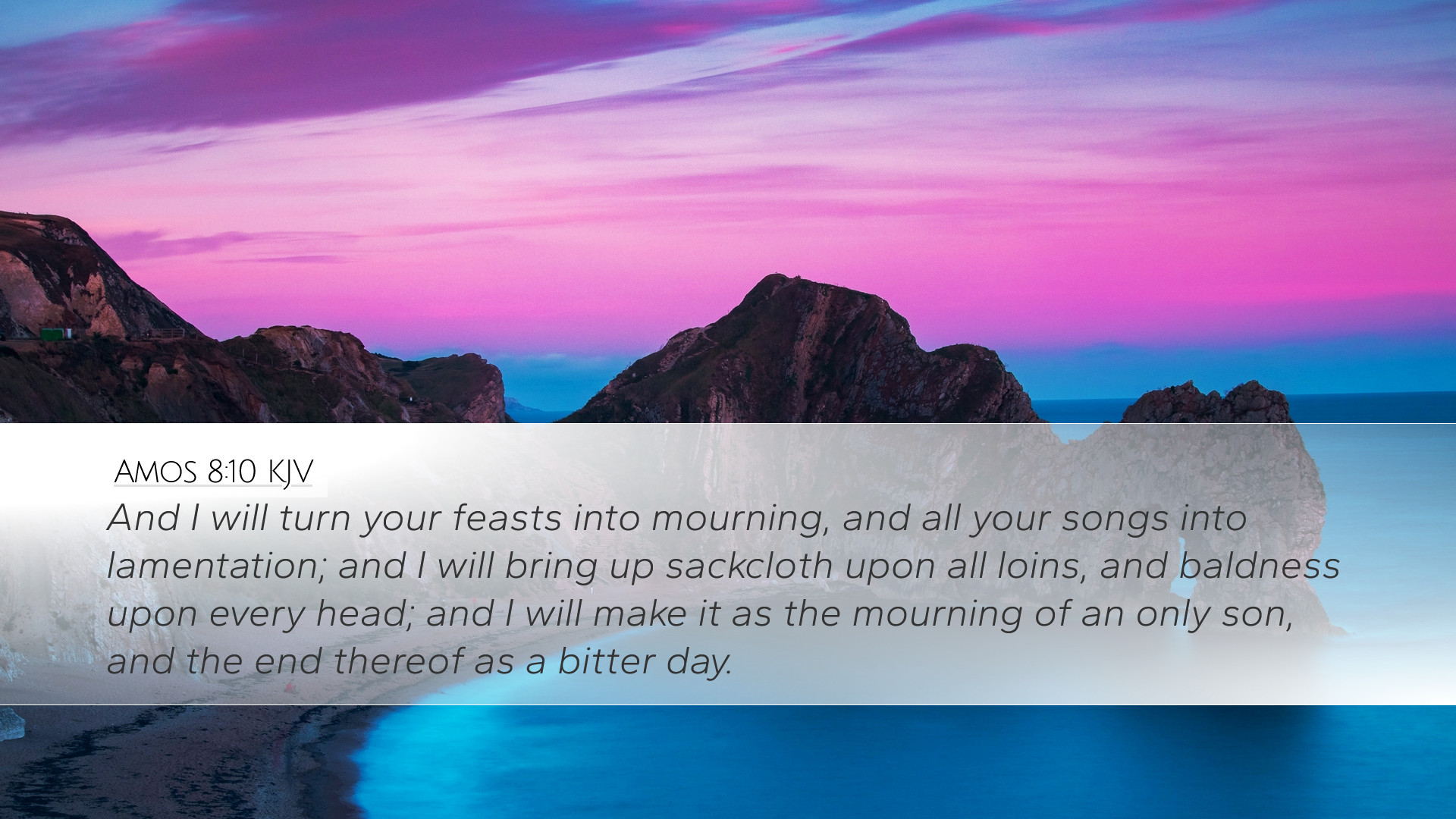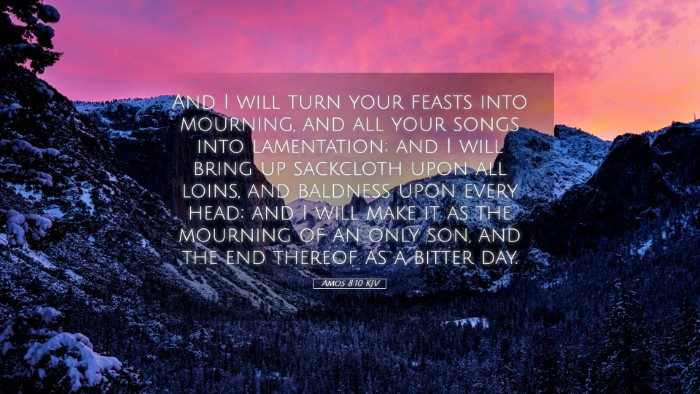Old Testament
Genesis Exodus Leviticus Numbers Deuteronomy Joshua Judges Ruth 1 Samuel 2 Samuel 1 Kings 2 Kings 1 Chronicles 2 Chronicles Ezra Nehemiah Esther Job Psalms Proverbs Ecclesiastes Song of Solomon Isaiah Jeremiah Lamentations Ezekiel Daniel Hosea Joel Amos Obadiah Jonah Micah Nahum Habakkuk Zephaniah Haggai Zechariah MalachiAmos 8:10
Amos 8:10 KJV
And I will turn your feasts into mourning, and all your songs into lamentation; and I will bring up sackcloth upon all loins, and baldness upon every head; and I will make it as the mourning of an only son, and the end thereof as a bitter day.
Amos 8:10 Bible Commentary
Commentary on Amos 8:10
Verse Analysis: Amos 8:10 states, "And I will turn your feasts into mourning, and all your songs into lamentation; and I will bring up sackcloth upon all loins, and baldness upon every head; and I will make it as the mourning of an only son, and the end thereof as a bitter day." This verse serves as a dire proclamation regarding the impending judgment of God upon the Northern Kingdom of Israel for their corruption and unrepentant attitude towards sin.
Contextual Overview
This verse is nestled within a broader context of divine judgment foretold by the prophet Amos. The prophet addresses the societal injustices, idolatries, and spiritual apathy that permeated Israel during a time of material prosperity. The feasts and songs, typically associated with joy and celebration, are subverted into expressions of mourning, indicating a radical shift in Israel's fate.
Commentary Insights
Matthew Henry's Commentary
Henry emphasizes the severity of God's impending judgment, which is illustrated by the transformation of Israel's joyful observances into deep lamentation. He notes that the feasts, which were meant for celebration, will become occasions for sorrow. According to Henry, this reflects the gravity of Israel's spiritual decline. He writes, "God's judgments will turn their joy into mourning, their songs into lamentations." This somber tone underscores the consequences of forsaking covenant faithfulness.
Albert Barnes' Notes on the Bible
Barnes draws attention to the symbolism of sackcloth and baldness, customs of mourning in ancient Israel. Sackcloth was worn to express grief and penitence, and baldness signified deep sorrow. He interprets these imagery elements as God’s way of demonstrating the intensity of the sorrow that would envelop the nation. Barnes articulates, “God will take away their gladness and fill them with sorrow, showing the extreme contrast between their current state and their future desolation.” This stark change from joy to mourning serves as a vivid reminder of the consequences of national sin.
Adam Clarke's Commentary
Clarke provides additional insight into the emotional weight behind the phrase "mourning of an only son." He reflects on how this imagery signifies profound grief, akin to the mourning experienced when a beloved child dies. Clarke asserts that the intensity of loss portrayed here is not merely a personal tragedy but represents the national calamity that Israel will face due to its apostasy. He writes, “This metaphor represents the comprehensive devastation and emotional toll that will arise from God's judgment.” Clarke emphasizes that such judgment is mercifully aimed at leading Israel toward repentance.
Implications for Theological Reflection
The somber nature of Amos 8:10 invites a deeper theological reflection on several critical points.
- Judgment and Mercy: The passage highlights a significant aspect of God's character—His willingness to judge, but also His desire for repentance. The sorrowful transformation is a reminder that divine judgment is closely connected with an opportunity for restoration.
- The Cost of Apostasy: Amos 8:10 illustrates that rejecting God’s commands results in grave consequences. This theme is recurrent throughout Scripture, warning believers of the serious nature of disobedience to divine law.
- Liturgical Awareness: The shift from feasts to mourning compels worship leaders today to consider the significance of true worship. Are modern expressions of worship aligned with God's character, or have they become hollow rituals?
Practical Applications
Pastors and theologians can draw several practical applications from this text:
- Call to Repentance: Use Amos 8:10 as a foundation for exhorting congregations to seek genuine repentance, understanding the weight of their actions before God.
- Understanding Mourning: Encourage discussions about the appropriateness of mourning in the Christian life, especially in relation to sin against God and injustice in society.
- Liturgical Practices: Evaluate church practices to ensure they reflect a genuine relationship with God, moving beyond mere cultural expressions and toward heartfelt worship.
Conclusion
Amos 8:10 serves as a profound reminder of the consequences of unfaithfulness and the character of God who desires truth in the inward parts. By learning from the insights provided in public domain commentaries, pastors, students, and scholars can engage deeply with this critical text, applying its lessons to contemporary faith and practice. The call to genuine worship and repentance remains timeless, rooted in the eternal truth of God's Word.


